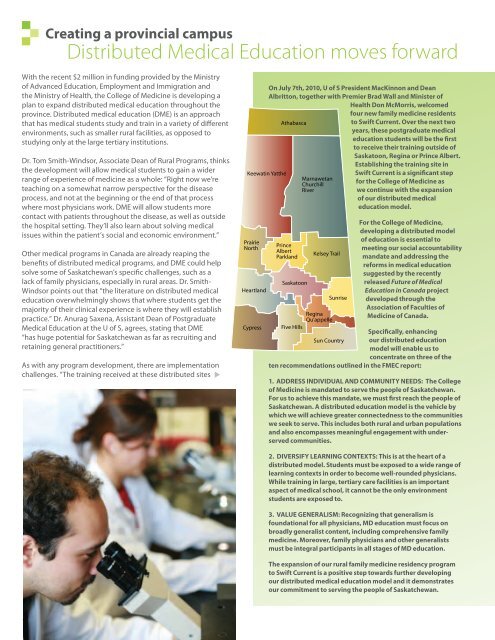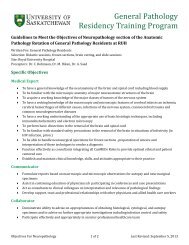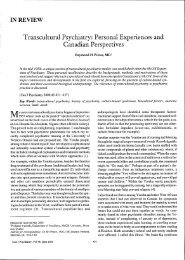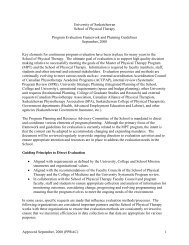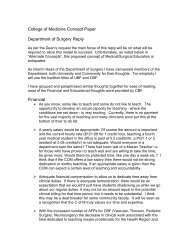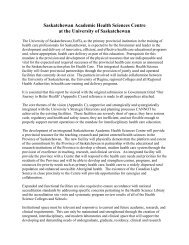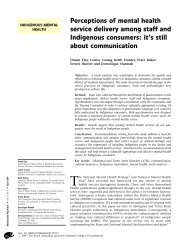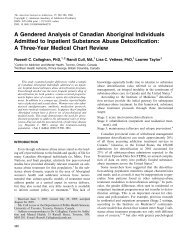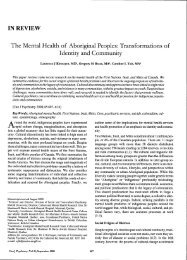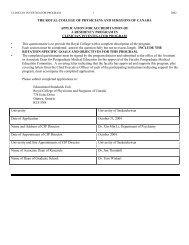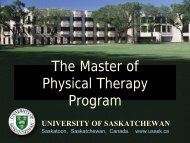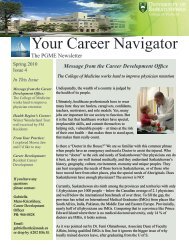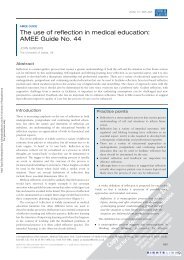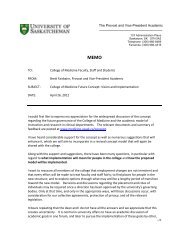COMMUNIQUé - College of Medicine - University of Saskatchewan
COMMUNIQUé - College of Medicine - University of Saskatchewan
COMMUNIQUé - College of Medicine - University of Saskatchewan
Create successful ePaper yourself
Turn your PDF publications into a flip-book with our unique Google optimized e-Paper software.
Creating a provincial campus<br />
Distributed Medical Education moves forward<br />
With the recent $2 million in funding provided by the Ministry<br />
<strong>of</strong> Advanced Education, Employment and Immigration and<br />
the Ministry <strong>of</strong> Health, the <strong>College</strong> <strong>of</strong> <strong>Medicine</strong> is developing a<br />
plan to expand distributed medical education throughout the<br />
province. Distributed medical education (DME) is an approach<br />
that has medical students study and train in a variety <strong>of</strong> different<br />
environments, such as smaller rural facilities, as opposed to<br />
studying only at the large tertiary institutions.<br />
Dr. Tom Smith-Windsor, Associate Dean <strong>of</strong> Rural Programs, thinks<br />
the development will allow medical students to gain a wider<br />
range <strong>of</strong> experience <strong>of</strong> medicine as a whole: “Right now we’re<br />
teaching on a somewhat narrow perspective for the disease<br />
process, and not at the beginning or the end <strong>of</strong> that process<br />
where most physicians work. DME will allow students more<br />
contact with patients throughout the disease, as well as outside<br />
the hospital setting. They’ll also learn about solving medical<br />
issues within the patient’s social and economic environment.”<br />
Other medical programs in Canada are already reaping the<br />
benefits <strong>of</strong> distributed medical programs, and DME could help<br />
solve some <strong>of</strong> <strong>Saskatchewan</strong>’s specific challenges, such as a<br />
lack <strong>of</strong> family physicians, especially in rural areas. Dr. Smith-<br />
Windsor points out that “the literature on distributed medical<br />
education overwhelmingly shows that where students get the<br />
majority <strong>of</strong> their clinical experience is where they will establish<br />
practice.” Dr. Anurag Saxena, Assistant Dean <strong>of</strong> Postgraduate<br />
Medical Education at the U <strong>of</strong> S, agrees, stating that DME<br />
“has huge potential for <strong>Saskatchewan</strong> as far as recruiting and<br />
retaining general practitioners.”<br />
As with any program development, there are implementation<br />
challenges. “The training received at these distributed sites<br />
s<br />
Keewatin Yatthé<br />
Prairie<br />
North<br />
Heartland<br />
Cypress<br />
On July 7th, 2010, U <strong>of</strong> S President MacKinnon and Dean<br />
Albritton, together with Premier Brad Wall and Minister <strong>of</strong><br />
Health Don McMorris, welcomed<br />
four new family medicine residents<br />
Athabasca<br />
Prince<br />
Albert<br />
Parkland<br />
Saskatoon<br />
Marnawetan<br />
Churchill<br />
River<br />
Kelsey Trail<br />
Regina<br />
Qu’appelle<br />
Five Hills<br />
Sunrise<br />
Sun Country<br />
to Swift Current. Over the next two<br />
years, these postgraduate medical<br />
education students will be the first<br />
to receive their training outside <strong>of</strong><br />
Saskatoon, Regina or Prince Albert.<br />
Establishing the training site in<br />
Swift Current is a significant step<br />
for the <strong>College</strong> <strong>of</strong> <strong>Medicine</strong> as<br />
we continue with the expansion<br />
<strong>of</strong> our distributed medical<br />
education model.<br />
For the <strong>College</strong> <strong>of</strong> <strong>Medicine</strong>,<br />
developing a distributed model<br />
<strong>of</strong> education is essential to<br />
meeting our social accountability<br />
mandate and addressing the<br />
reforms in medical education<br />
suggested by the recently<br />
released Future <strong>of</strong> Medical<br />
Education in Canada project<br />
developed through the<br />
Association <strong>of</strong> Faculties <strong>of</strong><br />
<strong>Medicine</strong> <strong>of</strong> Canada.<br />
Specifically, enhancing<br />
our distributed education<br />
model will enable us to<br />
concentrate on three <strong>of</strong> the<br />
ten recommendations outlined in the FMEC report:<br />
1. ADDRESS INDIVIDUAl AND COMMUNIty NEEDS: The <strong>College</strong><br />
<strong>of</strong> <strong>Medicine</strong> is mandated to serve the people <strong>of</strong> <strong>Saskatchewan</strong>.<br />
For us to achieve this mandate, we must first reach the people <strong>of</strong><br />
<strong>Saskatchewan</strong>. A distributed education model is the vehicle by<br />
which we will achieve greater connectedness to the communities<br />
we seek to serve. This includes both rural and urban populations<br />
and also encompasses meaningful engagement with underserved<br />
communities.<br />
2. Diversify lEARNING CONtexts: This is at the heart <strong>of</strong> a<br />
distributed model. Students must be exposed to a wide range <strong>of</strong><br />
learning contexts in order to become well-rounded physicians.<br />
While training in large, tertiary care facilities is an important<br />
aspect <strong>of</strong> medical school, it cannot be the only environment<br />
students are exposed to.<br />
3. ValUE GENERAlISM: Recognizing that generalism is<br />
foundational for all physicians, MD education must focus on<br />
broadly generalist content, including comprehensive family<br />
medicine. Moreover, family physicians and other generalists<br />
must be integral participants in all stages <strong>of</strong> MD education.<br />
The expansion <strong>of</strong> our rural family medicine residency program<br />
to Swift Current is a positive step towards further developing<br />
our distributed medical education model and it demonstrates<br />
our commitment to serving the people <strong>of</strong> <strong>Saskatchewan</strong>.<br />
12 C O M M U N I Q U É <strong>College</strong> <strong>of</strong> <strong>Medicine</strong> • <strong>University</strong> <strong>of</strong> <strong>Saskatchewan</strong>


